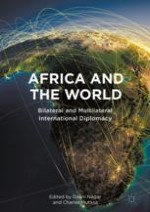2018 | OriginalPaper | Buchkapitel
15. Africa and the Middle East: Shifting Alliances and Strategic Partnerships
verfasst von : Hamdy A. Hassan, Hala Thabet
Erschienen in: Africa and the World
Aktivieren Sie unsere intelligente Suche, um passende Fachinhalte oder Patente zu finden.
Wählen Sie Textabschnitte aus um mit Künstlicher Intelligenz passenden Patente zu finden. powered by
Markieren Sie Textabschnitte, um KI-gestützt weitere passende Inhalte zu finden. powered by
